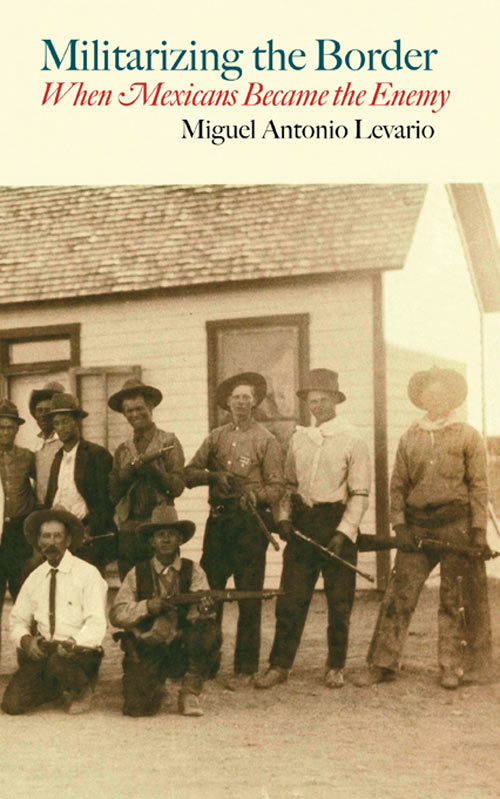Miguel A. Levario
Email: Miguel.Levario@ttu.edu
Office: 456 Humanities
Ph.D., University of Texas at Austin
Miguel A. Levario specializes in US-Mexico Borderlands, with emphasis on the twentieth century. His research focuses on the transnational context of immigration, militarization, and race in the U.S. West and Northern Mexico. His book, Militarizing the Border: When Mexicans Became the Enemy (College Station: Texas A&M University Press, 2012) explains current tensions and controversy over immigration and law enforcement issues centered on the US-Mexico border. In addition to his book, Levario has contributed to a number of edited volumes, including selected chapters in Holly M. Karibo and George T. Díaz's Border Policing: A History of Enforcement and Evasion in North America, titled “Home Guard: State-Sponsored Vigilantism and Violence in the Texas-Mexico Borderlands, Arnoldo De Leon's War Along the Border: The Mexican Revolution and Tejano Communities (Robert A. Calvert Book Prize 2011), titled "The El Paso Race Riot 1916." Additionally, Levario contributed a chapter covering the social history of the Trans-Pecos region in West Texas: A History of the Giant Side of the State (University of Oklahoma Press, 2014), edited by Paul Carlson and Bruce Glasrud. Levario has presented research at the Organization of American Historians, Western Historical Association, Texas State Historical Association, as well as, several other national, international, state and local conferences. Levario has published numerous articles and book reviews in the Journal of American History, Aztlán, The Chronicles of Oklahoma, Civil War History, among others. Several national and international media outlets have sought Levario for expert commentary on current and past conditions regarding immigration, drug smuggling, and national security along the US-Mexico border.
Levario was named the 2011-2012 Texas Tech Honors College Faculty Member of the Year. In 2011, Texas Tech University awarded Levario with the Scholars Incentive Award. In 2010, Levario was honored with the President's Excellence in Diversity and Equity Award. He was also nominated for this award in 2009. In 2009, Levario was awarded the Marlene Nathan Meyerson Fellowship by the Harry Ransom Center at the University of Texas at Austin. Since 2019, Levario has served as the program coordinator for Mexican American & Latina/o Studies.

Select Publications
Militarizing the Border: When Mexicans Became the Enemy
 As historian Miguel Antonio Levario explains in this timely book, current tensions
and controversy over immigration and law enforcement issues centered on the US-Mexico
border are only the latest evidence of a long-standing atmosphere of uncertainty and
mistrust plaguing this region. Militarizing the Border: When Mexicans Became the Enemy, focusing on El Paso and its environs, examines the history of the relationship among
law enforcement, military, civil, and political institutions, and local communities.
In the years between 1895 and 1940, West Texas experienced intense militarization
efforts by local, state, and federal authorities responding to both local and international
circumstances. El Paso's “Mexicanization” in the early decades of the twentieth century
contributed to strong racial tensions between the region's Anglo population and newly
arrived Mexicans. Anglos and Mexicans alike turned to violence in order to deal with
a racial situation rapidly spinning out of control.
As historian Miguel Antonio Levario explains in this timely book, current tensions
and controversy over immigration and law enforcement issues centered on the US-Mexico
border are only the latest evidence of a long-standing atmosphere of uncertainty and
mistrust plaguing this region. Militarizing the Border: When Mexicans Became the Enemy, focusing on El Paso and its environs, examines the history of the relationship among
law enforcement, military, civil, and political institutions, and local communities.
In the years between 1895 and 1940, West Texas experienced intense militarization
efforts by local, state, and federal authorities responding to both local and international
circumstances. El Paso's “Mexicanization” in the early decades of the twentieth century
contributed to strong racial tensions between the region's Anglo population and newly
arrived Mexicans. Anglos and Mexicans alike turned to violence in order to deal with
a racial situation rapidly spinning out of control.
Highlighting a binational focus that sheds light on other US-Mexico border zones in the late nineteenth and early twentieth centuries, Militarizing the Border, establishes historical precedent for current border issues such as undocumented immigration, violence, and racial antagonism on both sides of the boundary line. This important evaluation of early US border militarization and its effect on racial and social relations among Anglos, Mexicans, and Mexican Americans will afford scholars, policymakers, and community leaders a better understanding of current policy . . . and its potential failure.
Learn more at TAMU Press.
Department of History
-
Address
Texas Tech University, Box 41013, 3001 15th Street, Humanities (formerly English/Philosophy) 165, Lubbock, TX 79409 -
Phone
806.742.3744 | Fax: 806.742.1060 -
Email
info.history@ttu.edu
